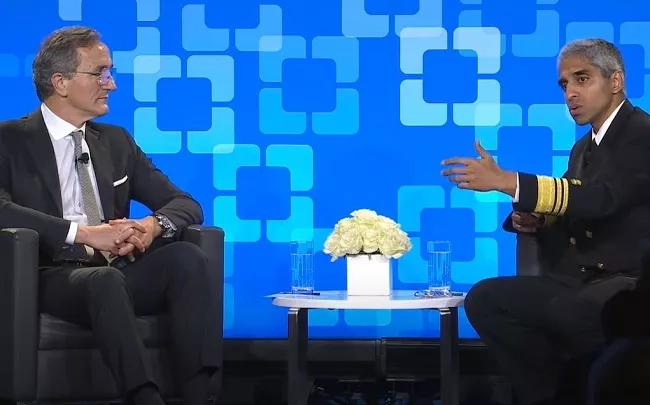The Nation’s Doctor visits Cleveland Clinic to call attention to urgent public health issues

Image content: This image is available to view online.
View image online (https://assets.clevelandclinic.org/transform/9b4858ba-5dd0-42ac-b498-82749b5ae57e/23-CCC-3827030-Surgeon-General-visit-650x4503-1_jpg)
23-CCC-3827030 Surgeon General visit 650×450(3)
For U.S. Surgeon General Vivek Murthy, MD, three numbers capture the severity of the mental health crisis engulfing the nation’s young people:
Advertisement
Cleveland Clinic is a non-profit academic medical center. Advertising on our site helps support our mission. We do not endorse non-Cleveland Clinic products or services. Policy
Although the nation is grappling with many public health issues, the mental health challenges facing children, teens and young adults are “the defining public health issue of our time,” Dr. Murthy said during a recent appearance at Cleveland Clinic. “Our kids are telling us through stories and through statistics that they’re not well, that they’re not doing OK.”
From social media pressures and gun violence to the pandemic’s ongoing impact, the country’s young people are dealing with unprecedented stresses.
Dr. Murthy’s concerns about the crisis and its far-reaching impacts — and the opportunity to help direct the federal government’s response — were factors in his decision to serve a second term as Surgeon General under President Biden. He previously held the office during the administration of President Obama. In 2021, Dr. Murthy issued an urgent Surgeon General’s advisory report calling the American people’s attention to youth mental health issues and providing recommendations for how it should be addressed.
He also has been on a national tour to bring awareness to the subject. In an in-depth conversation with Tom Mihaljevic, MD, CEO and President and Morton L. Mandel CEO Chair of Cleveland Clinic, before an audience of caregivers, Dr. Murthy talked about how the pandemic has exacerbated existing mental health stresses affecting children and families:
“One of the things we have learned from this pandemic is just how profound the impact is on kids. So many children experienced disruption of their education. They also lost loved ones. We had more than 160,000 kids who lost caregivers during the pandemic and that is one of the greatest traumas you can face as a child.
Advertisement
“When I do roundtables with children around the country, they tell me stories that are often deeply moving. One child told me that he was a fifth grader, an elementary school student, but during the pandemic he felt like he had to grow up because he saw how stressed his parents were, how worried they were about their jobs. He was struggling at school and was scared … but he didn’t want to tell them because he didn’t want to add to their stress. As a parent, you hear that and it’s heartbreaking,
“Even today, where we have better tools and more knowledge, I still find that children are saying the transition to coming back [from pandemic isolation] has been hard. Many of them, including high school students, say it’s almost like they forgot how to socialize in the ways they did before.”
The conversation between Drs. Murthy and Mihaljevic also touched on caregiver stress and burnout and the need for a national recommitment to caring for communities and each other. Click on the player below to view the full event.
Video content: This video is available to watch online.
View video online (https://www.youtube.com/embed/6-ZZAYMMH4g?feature=oembed)
U.S. Surgeon General Speaks About Youth Mental Health at Cleveland Clinic
Advertisement
Advertisement
A closer look at current uses and future opportunities
Patient navigator is the bridge across systems
Findings hold lessons for future pandemics
Pearls to reduce the strain of RSV, COVID-19 and influenza infections
No effect on symptom severity or disability, and low prevalence of long COVID
Promoting accessibility for all children
Dynamic modeling improves the accuracy of outcome predictions for ICU patients
5 things a child psychiatrist wishes all pediatricians would do